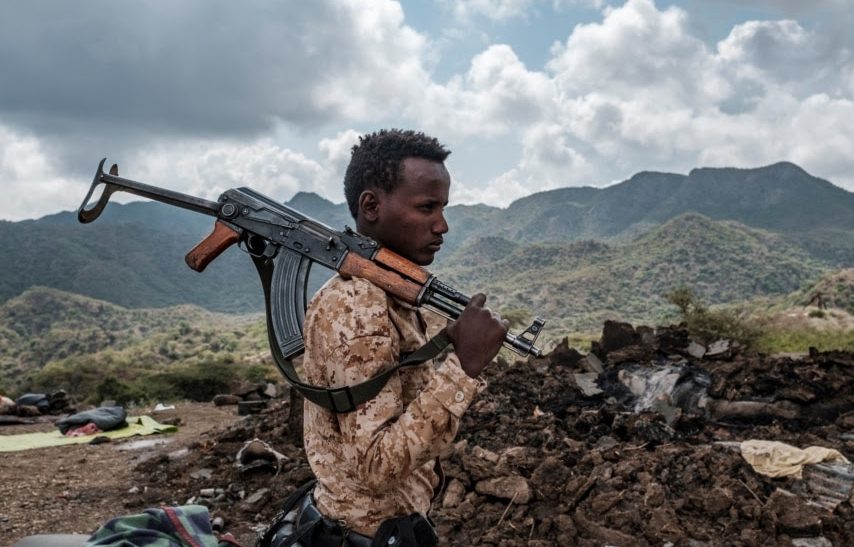Civil war has been raging in Ethiopia for over a year now, between the National Defence Forces of the Ethiopian Government, and rebel militia numbering some 250,000 fighters from the northern region of Tigray, the “TPLF”. This has left a trail of death, hunger, destruction and humanitarian catastrophe in the country.
The fighting started with a pre-emptive strike by the TPLF on federal armed forces on November 3, 2020, in an attempt to seize military weapons. This was promptly quashed by the Ethiopian national army, and controls were introduced on telecommunications and internet use in the Tigray region, making it difficult for international journalists to establish the facts about what has happened since. Cities and territories have changed hands over the past year, as battlefield fortunes have swung first one way, then the other.
The conflict has forced more than two million people from their homes, according to rough estimates
100,000 fatalities both military and civilian. The hostilities have become a source of extreme concern with the international community, worried about regional security in the unstable Horn of Africa. Ethiopia’s northern neighbor Sudan has taken advantage of the chaotic situation to make a land grab for part of Ethiopia’s territory on the frontier.
Recently, the TPLF has ratcheted up its hostile rhetoric making it clear that they intend to continue to seek to use military means to achieve their goals, and to refuse any peaceful dialogue. In essence, the dispute concerns a contest over the balance of regional power, and the inability of both sides to make the necessary compromises for a peaceful negotiated settlement that eliminates their political differences. Military analysts have suggested that both parties are evenly matched in the field and that any armed confrontation is likely to end in a stalemate. Realistically, if there is to be any resolution to the dispute, both sides need to be forced to the conference table
For its part, the national government declared a state of national emergency on November 2 for a period of 6 months, in order to enable them to bring the situation under control. The United Nations and the Intergovernmental Authority on Development, a bloc of East African countries, have both called for an immediate ceasefire. But once this step has been agreed upon by the protagonists, ending the civil war will require an inclusive national dialogue on how to restructure federalism in the country and resolve a dispute over sharing the political balance of power in controlling territories.
American and European efforts to bring pressure to bear on the respective parties and diplomatic manoeuvres involving the UN Security Council have failed. The African Union and neighbouring African states have also increasingly called for peaceful resolution of the conflict, but proposals for peace are yet to emerge. The first priority should be to stop the fighting, and for all parties to stop military action and cease bickering in the media. Key infrastructure to the Tigray region needs to be repaired, and the free movement of civil society, journalists, humanitarian aid organisations and other international actors must be restored.

The outcome of any dialogue about how to restructure the balance of power between the Federal Government and the regions should not be held hostage to negotiations. But it is essential that the main protagonists need to commit to respecting the need to secure a solution through a democratic process, and not by force of arms.
Perhaps peaceful dialogue could be facilitated by international objective and unbiased civilian observers drawn from Ethiopia’s neighbours and from the wider international family of nations? Their role would be to coordinate peace and reconciliation initiatives and promote the efforts needed to reconstruct areas damaged by the war. The selection of this group would need to be agreed by the main political forces.
The federal government has in fact announced plans to launch just such a dialogue. They have also included former political detainees in the government structure following the June elections. It is important for the international community, in particular the European Union, to actively support the efforts of the federal government which is committed to a democratic process. They should also condemn absolutely and without exception any attempts by the political forces involved to exploit belligerent methods which use the ammunition box rather than the ballot box to decide differences of opinion.
This is not a question of apportioning blame or taking sides in the conflict, it is a fundamental principle that democratic governance has to take precedence in resolving the dispute. The ultimate losers in any civil war are the citizens of the entire country. Ethiopia has already suffered more than enough through this crisis, and it is time to call off the dogs of war and bring in the emissaries of peace and reconciliation.
-------------------------------------------
By: Nicholas Waller
Title: The case for peace and reconciliation in Ethiopia
Sourced From: www.neweurope.eu/article/the-case-for-peace-and-reconciliation-in-ethiopia/
Published Date: Fri, 19 Nov 2021 12:58:03 +0000
Read More
Did you miss our previous article...
https://badpoliticians.com/uk-politics/cop26-climate-promises-dont-align-with-consumer-behavior-or-policies
 UK PoliticsWorld PoliticsVideosPrivacy PolicyTerms And Conditions
UK PoliticsWorld PoliticsVideosPrivacy PolicyTerms And Conditions
